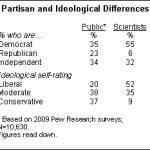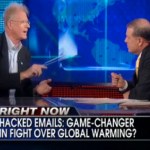Science communication research
On Thursday, at the Kennedy School of Government at Harvard, I served as one of the panelists at the event "The Public Divide over Climate Change: Science, Skeptics and the Media." The two hour session drew roughly 100 attendees, was organized and moderated by Belfer Center fellow Cristine Russell, and featured Andrew Revkin of the New York Times' Dot Earth blog and Thomas Patterson, Bradlee Professor of Government and the Press at the Kennedy School.
Audio of the panel is available at the Kennedy School web site and the event was covered in detail by the Columbia Journalism Review and the…
Much calamity has been made in popular books and by liberal commentators about the public's scores on quiz like survey questions tapping basic knowledge of scientific facts or the public's recognition of prominent figures in science.
Yet as social scientists have shown in various studies and have argued, we really shouldn't be surprised by the survey results on science literacy. Nor do studies find that these scores on literacy quizzes account for much of the variance in public opinion and perceptions about science-related debates, especially in comparison to other more influential factors…
Two surveys released this week provide more information on how public opinion may or may not be shifting relative to climate change and energy. I provide some highlights and quick context below on fears over a growing "climate fatigue."
Pew: Global Warming and Energy Wane as Perceived Priorities
Earlier this week, timed to tonight's State of the Union address, Pew released its annual survey of perceived policy priorities for the President and Congress. As has been the case the past few years, global warming ranked last among the more than 20 issues polled with only 28% of Americans rating the…
In the two days leading up to their annual conference in San Diego later this month, AAAS will be sponsoring a two-day workshop on improving climate change literacy through informal education activities.
I will be participating in one of the panels and I hope to be blogging summaries of the event. Below is a description of the special invitation only conference and go here for an agenda.
More than 150 educators from informal science institutions and projects--including science centers, museums, zoos, and aquariums; media projects; and community programs--will gather in San Diego to expand…
Nature magazine ran an editorial last week arguing the need for new directions in climate change communication, reflecting directly many of the themes shared at this blog and in past articles or presentations. Specifically, the Nature editors conclude:
The climate-research community would thus do well to use a diverse set of voices, from different backgrounds, when communicating with policy-makers and the public. And scientists should be careful not to disparage those on the other side of a debate: a respectful tone makes it easier for people to change their minds if they share something in…
Last week the NSF Science Indicators report was released, triggering more dramatic calls to action and overstated warnings from commentators about the alleged decline of science in American society. This predictable reaction is part of a decades enduring "fall from grace narrative" about the place of science in American society, a distracting if not harmful myth that I discussed in a co-authored article with Dietram Scheufele published earlier this year.
Since Sputnik, each decade has spawned a novel form of this American jeremiad, whether it be the Cold War race against the Russians,…
A recent article at the journal Science Communication reports on an innovative EU program that trained scientists in public engagement and science-society relations. Along with the Leopold Leadership Program, it is perhaps the best initiative to be developed to date and should be part of the blueprint for state-of-the-art training programs in the United States.
One of the program coordinators and authors of the article is Declan Fahy, who will be joining our faculty in the School of Communication at American University later this year. An experienced newspaper journalist, Fahy is…
CORRECTION: The Indicators Report will be released Friday, Jan. 15.
The bi-annual NSF Science Indicators report will be released on Wednesday. Chapter 7 of the report will contain a useful synthesis of public opinion trends on science-related topics along with review of research on other dimensions of the science-society relationship. Check back here later this week for discussion of the implications of the report.
Last month, I did an interview with the Philadelphia City Paper on the stolen CRU emails. The feature story provides useful background and context on the communication dynamics of the event. Yet in organizing these details and assembling quotes, the reporter applies a now dominant narrative that the controversy is the latest sign of the growing strength of the climate skeptic movement, a movement fueled by the "anti-science" hostility of American society.
The moral lesson of this narrative, told by liberal commentators and reflected at mainstream outlets and various science media, argues…
The American University news media relations office is running a Web feature that focuses on many of the themes discussed at this blog. The feature is in the form of a "Q&A." You can read the feature here. Below are the questions for which I responded with written answers.
Q: What is "framing" and why is it important?
Q: What, in your opinion, is the most pressing scientific issue in need of being reframed in the United States, and why does it need to be reframed (what about the communication of this issue has not worked to win over broader public support)?
Q: How would you reframe…
Slides and synchronized video of the presentations from the AGU panel "Re-Starting the Conversation on Climate Change: The Media, Dialogue, and Public Engagement Workshop" are now online. Below I link to each of the presentations highlighting key themes or conclusions and the minute mark in the video.
Mass Media and the Cultural Politics of Climate Change
Max Boykoff, Ph.D.
University of Colorado-Boulder
Mass media serve vital roles in the communication processes between science, policy-makers and the public. This presentation reviews contextual factors as well as journalistic pressures…
Roughly 90 scientists, journalists, educators, PIOs, and policy staffers turned out to Sunday afternoon's AGU workshop on climate change communication. I will have more to say about the panel in forthcoming posts, but for now, Steve Easterbrook provides an amazingly thorough, transcript-like overview of the panel and session. Slides and video of the presentations will eventually be posted at the AGU site.
From the Associated Press to the Guardian to Reuters to Agence France Presse,protesters and journalists create a confusing storyline focused on chaos, conflict, and law and order
It's too early to say what impact the protests in Copenhagen will have on the negotiating process or on world public opinion. However, when it comes to social protest generally, past research suggests several common and powerful barriers to communication success. There are a few rare exceptions, such as the Civil Rights marches of the 1960s, but on issues such as world trade, food biotechnology, or the war in Iraq…
ClimateGate: A now ubiquitous tagline that conveys a preferred storyline.
In a paper published earlier this year at the journal Environment, I explained how claims and arguments relative to the climate change debate can be classified and tracked using a typology of frames that are common to science-related issues.
With the recent controversy over the East Anglia stolen emails, one of these common frames has come to dominate discussion leading up to Copenhagen. What's different this time around is that climate skeptics and conservatives are applying the frame, rather than liberals and…
The journal Environmental Health Perspectives leads off its December issue with a news feature on the relevance of framing research to science communication. For readers who have followed recent review articles at Nature Biotechnology and the American Journal of Botany, the news feature adds additional insights.
EHP is a monthly journal of peer-reviewed research and news on the impact of the environment on human health. EHP is published by the National Institute of Environmental Health Sciences and its content is free online.
A week from today, at their annual meetings in San Francisco, the American Geophysical Union will be sponsoring a workshop I co-organized on research related to climate change communication and public engagement. In the context of debates over Copenhagen and the stolen climate change emails, the session is particularly timely and relevant. Details are below and advance registration is at this page. So far, roughly 100 attendees have registered.
Re-Starting the Conversation on Climate Change:
The Media, Dialogue, and Public Engagement Workshop
Sunday, 13 December (1:00 PM -5:00 PM)
Inter…
I've been busy the past week with wrapping up the semester. As a consequence, I have not had the chance to post about continuing developments related to the stolen emails from servers at University of East Anglia's Climatic Research Unit (CRU).
However, today is a convenient time to weigh in, since I share many of the same conclusions offered by Mike Hulme in recent op-eds at the BBC and Wall Street Journal.
Before discussing the Hulme articles, let me relay a few observations. Since the stolen email story broke, my concern has been that many bloggers and commentators are overlooking the…
Columbia University's Center for Research on Environmental Decisions has released a primer on the "Psychology of Climate Change Communication," synthesizing much of the research of the Center over the past several years. Written by Debika Shome and Sabine Marx, the primer is available both in HTML (by chapter) and in PDF format.
Readers will find of special interest the second chapter on the relevance of framing to communication. As I have noted, there is no such thing as "unframed" information. Whether you are a scientist, a public information officer, or a journalist, the choice is not…
For their upcoming annual meetings in San Francisco, the American Geophysical Union is sponsoring a pre-conference workshop introducing scientists, public information officers, journalists, and other attendees to several areas of social science research that examine dimensions of climate change communication and public engagement.
Below the fold are the details and the conference page is here. You can sign up for the workshop by visiting this page. It promises to be a great event and I am looking forward to the ideas, connections, and discussion that it generates.
Re-Starting the…
The Trust for America's Health and the Pew Environment Group released a report yesterday focusing attention on the public health impacts of climate change. The report is the latest in a series of expert statements on the subject. The most significant finding is that only 5 U.S. states have engaged in planning related to the public health consequences of climate change. Research I am currently working on with Edward Maibach and funded by the Robert Wood Johnson Foundation examines how to effectively engage Americans on the health consequences of climate change. We expect that studies from…



